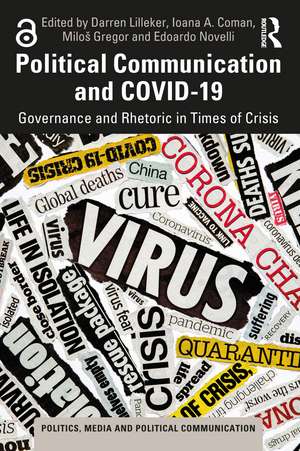Political Communication and COVID-19: Governance and Rhetoric in Times of Crisis: Politics, Media and Political Communication
Editat de Darren Lilleker, Ioana A. Coman, Miloš Gregor, Edoardo Novellien Limba Engleză Paperback – 19 mar 2021
This edited collection compares and analyses the most prominent political communicative responses to the outbreak and global spread of the COVID-19 strain of coronavirus within 27 nations across five continents and two supranational organisations: the EU and the WHO. The book encompasses the various governments' communication of the crisis, the role played by opposition and the vibrancy of the information environment within each nation.
The chapters analyse the communication drawing on theoretical perspectives drawn from the fields of crisis communication, political communication and political psychology. In doing so the book develops a framework to assess the extent to which state communication followed the key indicators of effective communication encapsulated in the principles of: being first; being right; being credible; expressing empathy; promoting action; and showing respect. The book also examines how communication circulated within the mass and social media environments and what impact differences in spokespersons, messages and the broader context has on the success of implementing measures likely to reduce the spread of the virus. Cumulatively, the authors develop a global analysis of the responses and how these are shaped by their specific contexts and by the flow of information, while offering lessons for future political crisis communication.
This book will be of great interest to students and researchers of politics, communication and public relations, specifically on courses and modules relating to current affairs, crisis communication and strategic communication, as well as practitioners working in the field of health crisis communication.
| Toate formatele și edițiile | Preț | Express |
|---|---|---|
| Paperback (1) | 297.09 lei 3-5 săpt. | +25.29 lei 5-11 zile |
| Taylor & Francis – 19 mar 2021 | 297.09 lei 3-5 săpt. | +25.29 lei 5-11 zile |
| Hardback (1) | 1007.39 lei 6-8 săpt. | |
| Taylor & Francis – 19 mar 2021 | 1007.39 lei 6-8 săpt. |
Preț: 297.09 lei
Nou
56.87€ • 61.79$ • 47.80£
Carte disponibilă
Livrare economică 31 martie-14 aprilie
Livrare express 15-21 martie pentru 35.28 lei
Specificații
ISBN-10: 0367636794
Pagini: 372
Ilustrații: 24 Tables, black and white
Dimensiuni: 156 x 234 x 25 mm
Greutate: 0.52 kg
Ediția:1
Editura: Taylor & Francis
Colecția Routledge
Seria Politics, Media and Political Communication
Locul publicării:Oxford, United Kingdom
Public țintă
Postgraduate, Professional, and Undergraduate AdvancedCuprins
Recenzii
Kathryn Biddle, in the Journal of Communication Enquiry
Notă biografică
Ioana A. Coman is an Assistant Professor at Texas Tech University, USA. She teaches courses focused on public relations, journalism, and entrepreneurship. Her research focuses on how different actors engage and interact in risk and crisis communication situations via different platforms, within different contexts, and at different levels. Her research has received national and international awards and grants including the Page/Johnson Legacy Scholar (2019 and 2020).
Miloš Gregor is an Assistant Professor at Masaryk University, the Czech Republic. He teaches courses on political communication and marketing, propaganda, disinformation, and fake news. Together with Petra Mlejnková, he is a mentor of projects Choose Your Info (Zvol si info) and Fakescape, both dedicated to media literacy awareness. Both projects received awards in the international Peer to Peer: Global Digital Challenge competition.
Edoardo Novelli is Associate Professor at the University of Roma Tre, Italy. He teaches Political Communication and Media Sociology. His research interests focus on political communication, history of propaganda, electoral campaigns, and on the relationship between politics, media, and images. He has been principal investigator of international research projects, including the European Election Monitoring Center, and he is Head of the digital Archive of Italian political commercials.
Descriere
This edited collection compares and analyses the most prominent political communicative responses to the outbreak and global spread of the COVID-19 strain of coronavirus within 27 nations across five continents and two supranational organisations: the EU and the WHO. The book encompasses the various governments' communication of the crisis, the role played by opposition and the vibrancy of the information environment within each nation.
The chapters analyse the communication drawing on theoretical perspectives drawn from the fields of crisis communication, political communication and political psychology. In doing so the book develops a framework to assess the extent to which state communication followed the key indicators of effective communication encapsulated in the principles of: being first; being right; being credible; expressing empathy; promoting action; and showing respect. The book also examines how communication circulated within the mass and social media environments and what impact differences in spokespersons, messages and the broader context has on the success of implementing measures likely to reduce the spread of the virus. Cumulatively, the authors develop a global analysis of the responses and how these are shaped by their specific contexts and by the flow of information, while offering lessons for future political crisis communication.
This book will be of great interest to students and researchers of politics, communication and public relations, specifically on courses and modules relating to current affairs, crisis communication and strategic communication, as well as practitioners working in the field of health crisis communication.









